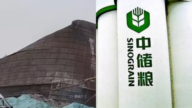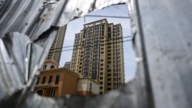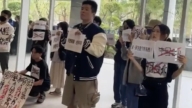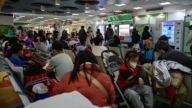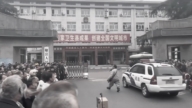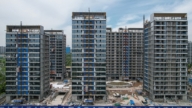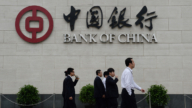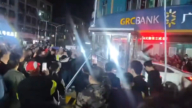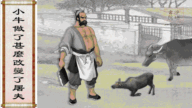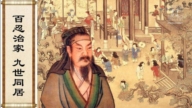【新唐人2011年12月6日讯】中共中央政法委书记周永康日前向省级干部讲话,要求各级政府把社会管理工作,作为“重大而紧迫”的课题来抓,应对经济的负面影响。外界分析,这番言论突显中共当局对于经济滑坡可能导致社会动荡,日益感到不安,唯恐中共十八大前引爆社会和政治危机。
周永康12月2号在一项座谈会上承认,当局还没有形成一套完备的社会管理体制机制。而目前中共所谓的“社会管理”也是维稳的代名词。
深圳“当代社会观察研究所”所长刘开明指出,将“社会管理”纳入中共政法委系统,是中共长期暴力维稳思路的延续和谬误。
刘开明:“我们社会应该有创新、社会应该有管理,而不是一味的从维稳角度镇压。但是,我们整个的社会创新或者管理它是放在政法委口,它是从传统专制的角度来看社会的管理、社会的创新,这样应该不利于社会的发展,因为现在主要的矛盾实际上是中国社会快速的转型。”
就在《新华社》发表周永康讲话的两天前,最新数据显示,中国制造业出现萎缩,中国央行为缓解经济更大的减速,而出台了下调存准率放松信贷的政策。
刘开明:“特别是出口工业下滑,很多的进城外来工都是在出口工业工作,整个目前社会保障还没有覆盖这个群体,他们返回农村的可能性又非常小,所以这样就会导致整个劳动力市场甚至经济的不稳定。”
最近,由于经济原因导致的罢工抗议明显增多。上海浦东的新加坡赫比家用电器厂因为迁厂无适当补偿,导致工人失业,引发工人罢工抗议。到12月5号,罢工已进入第6天。
深圳“精模电子科技厂”3千多员工11月22号大罢工,抗议加班时间过长,工人每天工作16个小时以上。广东东莞市一家台资鞋厂裁员搬厂,全厂6千工人11月17号罢工游行,当局派出数百警察武力驱散。
武汉建设银行12月1号发生爆炸案,造成2人死亡、15人受伤。政治经济评论家草庵居士指出,中共维稳模式只会导致社会更加不稳、民怨更深。
草庵居士:“中国的维稳费用已经超过了军费,这本身就说明了中国一个很大的问题,就是政治统治上出现了很大的危机,这个危机是民众对整个政府和社会的不满所形成的,而这种中国社会动乱已经是每年几十万起的数量发生了。”
广东省委书记汪洋最近尝试了应对群体事件新思路。11月18号,广州市花都区数百民工打着“还我血汗钱”等横幅,喊着口号游行讨薪,首次出现了警车开路、警察护航的场景。
11月21号,广东陆丰市乌坎村数千村民大游行,打着“反对独裁”、“还我人权”等大量标语,游行到市政府抗议非法征地、选举不公,当局也没有强行制止。
刘开明:“我觉得这个是一个积极的转向,很长的时间中国对群体事件大多数是高压来镇压下去,这样实际上导致更多的民怨。地方政府的某一些做法不一定具有全面性的,因为人为的因素、个人的因素很大,并不是制度性的都这么来处理,我们看不到这种变化。”
外界分析,当今中国经济、社会、政治危机,是中共极权腐败制度的必然结果,唯有进行根本的政治改革,否则各种危机会越来越严重。中共必然要解体。
新唐人记者周玉林、李元翰、李若琳采访报导。
CCP Prioritize Maintaining Stability Over Economic Slowdown
Recently, the Secretary of Central Political and Law
Committee of the Chinese Communist Party (CCP) regime,
Zhou Yongkang, gave instruction to provincial-level cadres.
Authorities at each level were asked to make social
management a priority as a “significant and urgent" task,
in order to offset the negative impact of economic slowdown.
Comments say that Zhou’s remarks indicate the CCP
regime’s growing anxiety over potential social unrest,
fearing a political crisis ahead of the CCP 18th Congress.
On December 2, Zhou Yongkang admitted at a seminar
that fully fledged social management mechanisms have not
yet been established by the CCP authorities in China.
However, the term “social management” by the CCP regime
is a synonym for “maintaining stability”.
Director of the Institute of Contemporary Observation in
Shenzhen, Liu Kaiming, points out that
incorporating social management into the CCP Central Political
and Law Committee system is an extension of a train of thought of violent stability-maintenance, and a long-term fallacy.
Liu Kaiming: “Our society should be developed with innovation
and management, rather than with blind suppression in view of stability maintenance.
Now the whole society is controlled by CCP’s Political and
Law Committee.
It treats social innovation and management from the
perspective of authoritarian rule, which is not conducive to social development.
In reality, the current main contradiction is focused on the
issue of Chinese societies rapid transformation."
Just two days before Zhou’s speech, the latest data showed
that China’s manufacturing sector began shrinking.
China’s central bank cut the Reserve Requirement Ratio and
eased monetary policy to alleviate the pressure of economic slowdown.
Liu Kaiming: " Decline in exports is particularly obvious.
Lots of migrant workers are working in the export sector.
But the current social security system hasn’t covered this
group of people.
The possibility of returning to their rural hometowns
is very small.
So in the future, this may result in an instable labor market
and even an unstable economy."
Recently, China is seeing a significant upsurge in labor
strikes related to the economic slowdown.
A strike of laid-off factory staff of Hi-P International in Shanghai,
a Singapore electronics firm, entered the 6th day on December 5.
The relocation of the Hi-P Shanghai factory generated
mass layoffs, and did not offer reasonable compensations to employees.
On November 22, over 3,000 staff of Shenzhen-based
Jing Mold Electronic Technology Co. staged a strike to protest excessive overtime working, over 16 hours per day.
In Dongguan, a Taiwanese-owned shoe factory’s relocation
and job cut provoked a strike by 6,000 employees.
CCP local authorities mobilized hundreds of police to
disperse the strike with violence.
Wuhan Construction Bank was bombed on December 1,
causing two deaths and 15 injuries.
Political commentator Cao’an Jushi believes that
the model of CCP’s stability maintenance will only lead to more social instability and deeper civilian resentment.
Cao’an Jushi: “China’s stability maintenance expenditure
has exceeded the military expense.
This fact itself tells a big problem in China; that is,
a great crisis arose from the political ruling.
The crisis was caused by public discontentment, both with the
regime and society, while such social unrest has reached hundreds of thousands each year. “
CCP Secretary of Guangdong, Wang Yang, recently
tried a new way to cope with the mass protest.
On November 18, hundreds of migrant workers in Huadu
District, Guangzhou, took to the streets, shouting slogans and
holding banners written in words “Return my hard-earned
money". For the first time, police cars accompanied the parade of protesters.
On November 21, thousands of villagers from Lufeng,
Guangdong staged a mass demonstration.
The protesters marched to the city hall to protest official’s
illegal acquisition of land and inequitable elections,
holding banners with words such as “against dictatorship"
and “return my human rights."
Guangdong authorities did not repress the protest.
Liu Kaiming: “I think this is a positive direction.
For a long time, China’s authorities have taken heavy-handed measures
to crack down on the mass protests, which actually
incurred more resentment.
The actions of some localized authorities’ cannot
represent holistic perspective, as human factors and personal factors are significantly involved.”
Analysts say that in today’s China, the emergence of economic,
social and political crises is an inevitable result of a corrupt CCP totalitarian system.
Only by carrying out fundamental political reforms,
can these crises be addressed.
Otherwise, they will become increasingly intensified.
The CCP itself is bound to disintegrate.
NTD reporters Zhou Yulin, Li Yuanhan and Li Ruolin


